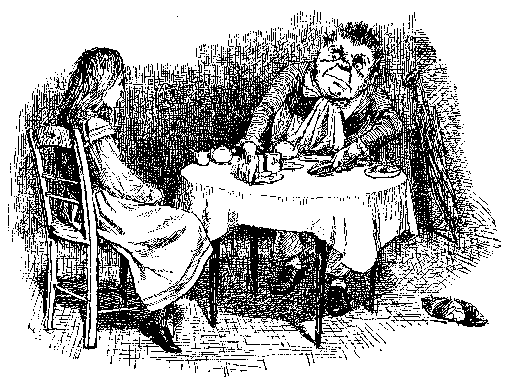A New Alice in the Old Wonderland

By Anna Matlack Richards
New edition, 2009. Illustrations by Anna Richards Brewster. Cathair na Mart: Evertype. ISBN 978-1-904808-35-0 (paperback), price: €11.95, £10.95, $14.95.Click on the book cover on the right to order this book from Amazon.co.uk!
Or if you are in North America, order the book from Amazon.com!
| “Will you please tell me who you are?” Alice asked.” | ||
| “I’m Tweedle,” he said, watching her very closely as she came in and took the only empty chair in the room, a seat opposite to him at the table. He immediately removed the jam and cakes to his own side of the table, out of her reach as he thought. | ||
| “I shall want all these myself,” he said. | ||
| “I don’t want any, I’m sure,” said Alice. “You’re not very polite, certainly.” | ||
| “I know it,” said Tweedle; “but this is my supper; contrariwise, if it was yours, I’d ask you to take some. But are you really sure you don’t want any?” | ||
| “Really and truly,” answered Alice. | ||

|
||
|
Anna Matlack Richards (1835–1900) was a poet, playwright, and author, a Pennsylvania Quaker whose reputation as a poet had been established by the time she was twenty. At twenty-one, she married William Trost Richards, and both he and their daughter, Anna Richards Brewster, were American artists of some renown. Richards was fifty-five when she published her children’s fantasy, A New Alice in the Old Wonderland. Although an imitation of Lewis Carroll’s Alice books, it is also subtly critical of them, and its gentle satire is reflected in the sensitive illustrations in the style of Tenniel drawn by Anna Brewster. Carolyn Sigler has written on this aspect of A New Alice, which she considers outstanding among Alice imitations.
The judgement of critics, of course, does not affect the story. It is a pleasant task to edit a century-old book for re-publication and a new generation of readers. Here, as in my other editions of Alice books, I have kept to the book design inspired by Martin Gardiner’s Annotated Alice. I have edited certain features in Anna Richards’ text of 1895, in order to bring it closer to modern tastes in format and language. I have normalized “Your Majesty” to “your Majesty” and followed Carroll’s example in similar cases. I have preferred the more modern “eh?” to “hey?”, “recipe” to “receipt”, “curtsey” to “courtesy”, and “Jew’s harp” to “jewsharp”. I have regularized the capitalization of nouns in “Der leedle Johann Schmaus”. Where Richards follows Websterian spelling, I have altered to Oxford orthography. In places, Anna Richards’ 19th-century punctuation has been altered to conform to modern practice. I have also edited out two notable features of the author’s dialect: Humpty Dumpty’s “should ’a’ been” for “should have been” and “hadn’t ’a’ had” for “hadn’t had” (neither warranted by Through the Looking-Glass); and the third-person present singular use of “don’t” for “doesn’t” throughout. These dialect features are distinctively American (my mother’s mother, born in Eastern Pennsylvania in 1915, also used “don’t” for “doesn’t”) and seemed out of place in Lewis Carroll’s very English Wonderland. On the other hand, I have retained Richards’ use of Irish dialect by the workers (p. 102) and by the King of Clubs (p. 138); Irish immigrant dialect would have been well-known to Richards, though is unclear whether Richards’ use of Irish English is intended to convey positive or negative connotations, or if it’s just there for flavour. Finally, since people are sure to ask… I felt that Carroll’s preference in writing “ca’n’t”, “sha’n’t”, and “wo’n’t” would be good for the conceit. Michael Everson |
||